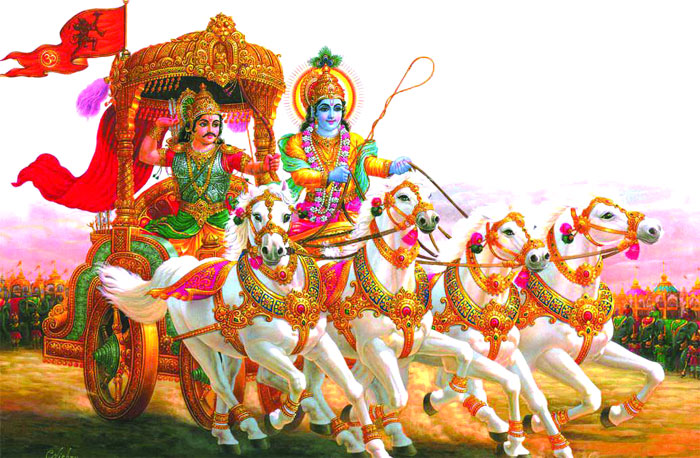It addresses the problems of people with the help of its moral, spiritual, and ethical code, and is hence called a world scripture, writes Dr Asha Goswami
Krishna’s Gita generally known as Bhagavad Gita is a great contribution of the Indian nation to the world due to its golden preaching of Yoga as a mode of bonding together one’s physical and psychological faculties through which one becomes capable of making life well balanced, harmonious, completely enhanced and successful in all aspects. Addressing the problems and needs of the people of all times and climes with the help of its moral, spiritual, and ethical code, it claims for itself the title of world scripture rather than being only acknowledged as the mainstay of Hinduism or Indian culture.
Besides, it also proves to be a science or art of conduct for leading a successful life, as its teaching of Karmayoga proves as optimistic art of living that leads everyone towards a concrete way of life with full instructions with regard to human beings’ daily routine, such as food, duties, thoughts, and responsibilities by defining varied human comprehensions, understandings and tendencies, temperament along with the truths of high ideals and needs with which the people are not generally awakened although with which they have to grow on. This would be only possible if they are not affected by the clash of duties and interests as a member of the family or as a part of society or as a creature of the creator.
Thus, the Gita discusses all issues related to human life since Kurukshetra, the place where it was taught to Arjuna, serves as a symbol of human life, as the body-centred life itself is akin to the battlefield or a warfare. Thus, the following study aims at providing those golden maxims of Gita which may serve as nectar boons to the human beings for leading successful ideal life. These are those maxims which teach us what is a human being, what is his/her state in the world, what relation he/she has with the world, society and the fellow beings, what ought to be his mode of leading his life, what ought to be the mission and goal of his life. Thus, according to Gita, for achieving success all through one has to first develop a balanced mindset by controlling the forces of attraction and repulsion and also forming a bond between “him, God, universe, and fellow beings” with all his thoughts.
Further, one is also instructed that by keeping in mind the truth that the fellow beings’ nature which is governed by their triple sattva-rajas-tamas qualities is prone to vary on spiritual, rational counts, and is hard to be changed, has to behave with them accordingly by mending one’s own attitude. Similarly, next in Gita, one is assured with a big positive note that God is at the beck and call of every person, and in the hour of need, that supreme power will reach the needy to render help. Gita also guides that for achieving success, one has to put a stop on one’s doubting nature and have faith in himself, in his capabilities, and always feel assured that his actions will bear positive results. It exhorts us to acquire deep knowledge in our field of activities. For, if one is endowed with proper knowledge and right understanding of the facts along with great faith in the counsel of the experts in his field, he is bound to succeed.
As, the Gita has made it clear that one’s good faith in mentors’ advice, and his individual nature both determine one’s actions that bear positive results, and also his faith makes him what he wants to be since his actions in life are the outcome of this very state. This maxim may prove of great use to the students who are guided to pursue their studies with right understanding, having full faith and reverence in the teachers and in their teaching. Gita’s other advice “that God is the agent and man is only an instrument” may also serve as strong medium for success in our life activities since it encourages one to deeply concentrate on actions alone and not waste time and energy thinking about results which are not for him to seek, but for the Almighty to grant.
Gita’s another teaching applicable for achieving success in life is that one must be confident and have faith in life, as the same spirit will give him strength and personal power which will make him win over all the difficulties in life with inner calmness. Gita also assures us “that due rewards of our actions will reach us in course of time”. Another maxim that human beings never act uniformly as they have varied nature also proves helpful for maintaining harmonious relation in society, which automatically serves as a great asset for achieving success in life by keeping in mind that we are not alone as individuals but related to each other as society.
One must also achieve self-mastery by controlling self and practising ethical ideals. Similarly, for achieving success, one is advised to practise creative resistance, tolerance towards every faith, and to concentrate on the current issues facing life. Gita’s golden maxim that in all times in life while discharging duty be in Yoga ie, integrate buddhi with senses and the natural forces also assures us of all success. Gita also warns that for achieving success one has to shun self-pity and work with selfless dedication as an offering to the Almighty. For enhancing one’s personality traits, one is also advised to put away weak points and curb ego, which yields to limiting of one’s personality and stands in his way of betterment. Select your goal in life according to your natural qualities, and the divine power vested in you will free you of all problems.
The writer is a noted Indologist and authority on Krishnaite Studies


























